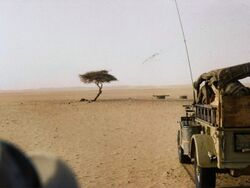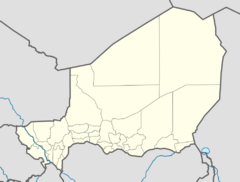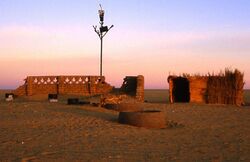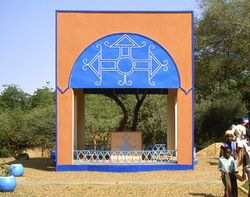Biology:Tree of Ténéré
[ ⚑ ] 17°45′00″N 10°04′00″E / 17.75°N 10.0666667°E
The Ténéré Tree (French: L'Arbre du Ténéré) was a solitary acacia (Vachellia tortilis)[1][2][3] that was once considered the most isolated tree on Earth,[4] the only one for over 400 kilometres (250 mi). It was a landmark on caravan routes through the Ténéré region of the Sahara Desert in northeast Niger, so well known that it and the Arbre Perdu (Lost Tree) to the north are the only trees to be shown on a map at a scale of 1:4,000,000. The Tree of Ténéré was located near a 40-metre (130 ft) deep well. It was knocked down in 1973 by a truck driver.
Background
The Tree of Ténéré was the last of a group of trees that grew when the desert was less parched than it is today. The tree had stood alone for decades. During the winter of 1938–1939 a well was dug near the tree and it was found that the roots of the tree reached the water table 33–36 meters (108 to 118 feet) below the surface.
Commander of the Allied Military Mission Michel Lesourd, of the Service central des affaires sahariennes [Central service of Saharan affairs], saw the tree on May 21, 1939:
| “ | One must see the Tree to believe its existence. What is its secret? How can it still be living in spite of the multitudes of camels which trample at its sides. How at each azalai does not a lost camel eat its leaves and thorns? Why don't the numerous Touareg leading the salt caravans cut its branches to make fires to brew their tea? The only answer is that the tree is taboo and considered as such by the caravaniers.
There is a kind of superstition, a tribal order which is always respected. Each year the azalai gather round the Tree before facing the crossing of the Ténéré. The Acacia has become a living lighthouse; it is the first or the last landmark for the azalai leaving Agadez for Bilma, or returning.[5] |
” |
In his book L'épopée du Ténéré, French ethnologist and explorer Henri Lhote described his two journeys to the Tree of Ténéré. His first visit was in 1934 on the occasion of the first automobile crossing between Djanet and Agadez. He describes the tree as "an Acacia with a degenerative trunk, sick or ill in aspect. Nevertheless, the tree has nice green leaves, and some yellow flowers". He visited it again 25 years later, on 26 November 1959 with the Berliet-Ténéré mission, but found that it had been badly damaged after a vehicle had collided with it:
| “ | Before, this tree was green and with flowers; now it is a colourless thorn tree and naked. I cannot recognise it — it had two very distinct trunks. Now there is only one, with a stump on the side, slashed, rather than cut a metre from the soil. What has happened to this unhappy tree? Simply, a lorry going to Bilma has struck it... but it has enough space to avoid it... the taboo, sacred tree, the one which no nomad here would have dared to have hurt with his hand... this tree has been the victim of a mechanic...[5] | ” |
Death and monument
The Tree of Ténéré was knocked down by a reportedly drunk truck driver in 1973.[6][7] On November 8, 1973, the dead tree was moved to the Niger National Museum in the capital Niamey.[5]
A simple metal sculpture representing the tree stands where the tree once grew.[7]
In popular culture
The sculpture representing the Tree of Ténéré and the Tree's story feature prominently in the 2006 film La Gran final (The Great Match). In the film, a group of Tuareg nomads in the Sahara race to find a power supply and broadcast reception for their television in time to watch the 2002 FIFA World Cup Final between Germany and Brazil, eventually using the tree sculpture as a makeshift antenna.
In 2017, a group of artists created a massive, four-story tall LED sculpture entitled Tree of Tenere that was showcased at Burning Man. The sculpture consisted of 25,000 molded leaves containing 175,000 LEDs.[8]
In 2018, the tree's story appeared as a main theme in the official music video of 'Transmission/Michaelion'[9] by Ibeyi.
See also
- Dry tree
- List of individual trees
References
- ↑ Riedacker, A. (1993) (in French). Physiologie des arbres et arbustes en zones arides et semi-arides: séminaire, Paris-Nancy, 20 mars-6 avril 1990. John Libbey Eurotext. p. 406. ISBN 2-7420-0019-4. https://books.google.com/books?id=mL62aLtlF2YC&pg=PA406. Retrieved 2009-08-11. "L'Hote (1961) note dans son article sur l'arbre du Ténéré (Acacia raddiana) que l'on aurait retrouvé ses racines à 30 métres de profondeur."
- ↑ Le Roy, Robert (1998) (in French). Méhariste au Niger: souvenirs sahariens. Karthala Editions. p. 108. ISBN 2-86537-778-4. https://books.google.com/books?id=beEsVfvm87wC&pg=PA108. Retrieved 2009-08-11. "It avait fallu à cet acacia tortilis une belle vigueur et une fameuse chance pour subsister là, seul, jusqu'à élever son feuillage hors de portée des gazelles."
- ↑ Kyalangalilwa, Bruce; Boatwright, James S.; Daru, Barnabas H.; Maurin, Olivier; van der Bank, Michelle (2013-08-01). "Phylogenetic position and revised classification of Acacia s.l. (Fabaceae: Mimosoideae) in Africa, including new combinations in Vachellia and Senegalia". Botanical Journal of the Linnean Society 172 (4): 500–523. doi:10.1111/boj.12047. ISSN 0024-4074. https://doi.org/10.1111/boj.12047.
- ↑ Wagensonner, Eric (2007-01-15). "Eastern Mali to Niger to Timbuktu - 2–19 September 06". Border-Crossings. http://www.border-crossings.net/site/journal/present/niger/1.html. Retrieved 2009-08-11.
- ↑ 5.0 5.1 5.2 L'Arbre du Ténéré, Part 2
- ↑ L'arbre du Ténéré, symbole de la survie dans le Sahara(in French)
- ↑ 7.0 7.1 Molly McBride Jacobson (ed.), "Last Tree of Ténéré", Atlas Obscura, December 4, 2008; accessed 2023.01.09.
- ↑ Kane, Jenny (July 19, 2017). "Burning Man tree of lights inspired by world's loneliest tree". https://www.rgj.com/story/life/arts/burning-man/2017/07/19/burning-man-tree-lights-inspired-worlds-loneliest-tree/470439001/.
- ↑ https://www.youtube.com/watch?v=g70u2OrfVBE music video by Ibeyi
External links
 |





